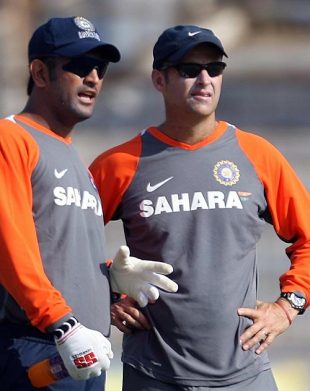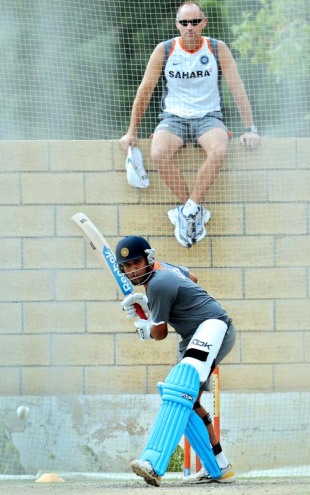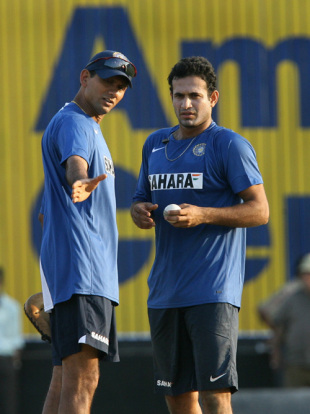|
|
|

India's captain and coach are different as men, but they've come together well and built and intuitive understanding
© AFP
|
|
| |
"I would call one the facilitator, I would call the other, well, just fantastic to work with." It was a throwaway line from a key member of the Indian cricket team, but it managed to capture in a nutshell what others before had struggled to pin down.
That one line - simple, direct and to-the-point - also contained all the qualities that players, officials and team associates insist is the secret behind the captain-coach combination that is currently steering Indian cricket through an incredibly confident phase.
Mahendra Singh Dhoni and Gary Kirsten have won all three Tests they have combined in so far, against top-class opposition - South Africa
in Kanpur this April, and Australia over the last two months, in
Mohali and
Nagpur. They have not done too badly in the one-day game either, except for an early, embarrassing loss to Pakistan in the final of the
Kitply Cup in Dhaka last June. They also reached the final of the
Asia Cup in Pakistan, showed the way against Ajantha Mendis
in Sri Lanka, and
swept England away last month.
Now, as they prepare for their first full Test assignment together, against England, the coming together of Dhoni and Kirsten is being described as an "intuitive partnership" between two diverse men with common ideas and ideals.
It is said that both want to win at any cost, have a lot of respect for each other, prefer to be low-profile, and come across in one-on-one interactions as refreshingly humble. Interestingly, and some say importantly for Indian cricket, both can be brutally honest too.
"There are some of us who have been close to Dhoni, spending a lot of time together before he became captain," says a former Indian team member. "The way it goes in India, some of us have expected Dhoni to carry over that friendship when it comes to team selection, or while taking decisions on the field, but have ended up disappointed. He is not an angel and still does the funny things that he used to with his gang, but he has made it clear by his actions that when it comes to his team, winning is all that counts. He is selfish that way, and also ruthless."
Kirsten is no different. "Don't get fooled by that smile," a former coach who worked with him in South Africa warns. "He knows when to step in and draw the line. In fact, that is what I feel has worked for him in India where he is managing superstars - keep a low profile, but make your presence felt within when it matters."
| |
|
|
|
| |
| Kirsten's stress has been on making the coaching approach as broad as possible, allowing some to go on gut instinct and others to pay more attention to planning and strategy, if that is what works for them |
| |
From the time they got together in Australia early this year for a few "tentative chats" before Kirsten flew down to India for the Test series against his home team, Dhoni and he have clearly identified their areas of authority.
Kirsten and the support staff - Venkatesh Prasad, the bowling coach; Robin Singh, the fielding coach; and Paddy Upton, the mental conditioning coach who also doubles up as physical trainer - are the facilitators. Together they ensure that they don't stand in the way; that they talk to players, not down at them; most importantly they "aggressively ensure" that each team member is fully involved and participates in discussions.
A clear-cut division of roles
Dhoni is the executioner, completely in charge of what happens on the field, reading the game like a card sharp, operating on instinct, often dumping elaborate plans without a second thought. He has been described as a patient listener, soaking in inputs and "taking support from everyone within the team, as long as he is sure that they are giving him 100% and more". What really works for him, a team-mate says, is his uncanny ability to spot match-winners for every game and even for specific match situations.
Kirsten, meanwhile, is a believer in personalised interactions with players, and knows that in the case of somebody like Sachin Tendulkar it is not a matter of batting tips but more of ensuring that the master is mentally in the right space. He believes in handing out responsibilities, doesn't over-react, and ensures he gives the players their space. The stress has been on making the coaching approach as broad as possible, allowing some to go on gut instinct and others to pay more attention to planning and strategy, if that is what works for them.
In short, what Kirsten does off the field is a mirror image of what Dhoni does on it - remember the way the captain let Zaheer Khan set the field for Ishant Sharma during the crucial batting Powerplay against England
in Bangalore last month? Like Dhoni, Kirsten allows players to take on responsibility, and apparently the players have responded. "What Gary and Dhoni have repeatedly suggested to the players is, 'It is not about us, it is about you'," a team official says. "The message that has repeatedly been underlined is that the coaches are not there to boss the players around, an approach which is destined to meet with more resistance than not."
|
|
|

Paddy Upton's area of focus is the team's overall mental and physical well-being
© AFP
|
|
| |
Both captain and coach have largely similar long-term goals too. For instance, Kirsten and Dhoni, like Anil Kumble earlier, are committed to a rotation policy to prevent fatigue, injury, and subsequent loss of form. "It won't be easy - it never is," Kirsten wrote in June about implementing such a policy, "but I'm sure there is a sufficient level of maturity and understanding among the players to accept that there is simply too much cricket for any single player to perform at his best all the time."
One month later, after the idea failed to gain much ground within the Indian board, Dhoni decided to show the way by pulling out of the Test series against Sri Lanka. Since then the team has rested its two strike bowlers, Zaheer and Ishant, in a "planned manner".
Modus operandi
Dhoni's idea of a team-bonding session often is to plonk himself down in the team hotel corridor, order tea, and catch up with his team-mates as they join him one by one for a chat on everything under the sun, including, of course, cricket. Kirsten may not be quite so informal, but he can be innovative when he wants to: he once asked his staff to bring along to a meeting anything that caught their eye which captured their character best. One of them brought along a bottle of water, to indicate that he would fit in anywhere. Crucially, both captain and coach are each comfortable with the other's methods.
Dhoni has exceptional leadership qualities, Kirsten told the Daily Telegraph recently. "He's a very street-wise cricketer and likes to think out of the box. That's lovely, because I like to think out of the box too." Both apparently seem to agree that every person is an individual, with unique gifts, strengths and dislikes, and so the approach would be to accommodate these as far as possible while remaining with a common team framework.
The support cast
It has helped, of course, that Prasad, Robin and Upton are on the same page and are proactively involved in the support role, each playing his well-defined part.
Upton looks after "the mental and physical well-being of the team as a whole" and organises "team activities". "During the pre-Australia series Test camp in Bangalore, he took the team to a nearby resort, divided the boys into groups of three, and got each group to make its own version of popular Hindi movies," a team member reveals. One group had Virender Sehwag, in a wig, as its heroine. DVDs of the exercise, with mock titles, were distributed later and acting awards handed out. "It was hilarious, but it also set the team in the right frame of mind before an important series."
Prasad works individually with the bowlers and talks to them separately, listening more than talking, taking the time to understand their mindset. The rehabilitation of the temperamental Munaf Patel is a case in point.
In fact, a large share of the credit for the Dhoni-Kirsten chemistry goes to the base that was laid by Robin and Prasad, who took over the team's training after India's disastrous World Cup last year. Equally important was the role played by Ravi Shastri, the interim coach, in settling the nerves of the team that flew to Dhaka for a Test and one-day series barely a month after the Caribbean misadventure.
| |
|
|
|
| |
| Dhoni's idea of a team-bonding session often is to plonk himself down in the team hotel corridor, order tea, and catch up with his team-mates as they join him one by one for a chat on everything under the sun |
| |
The team was in tatters after reports of a divide between senior and junior players under Greg Chappell, the previous coach, and Shastri, a former captain, who is close to many Indian players, began the tour by delivering an intensely personal speech, asking players to bury their differences and get to know each other. "That was the beginning," a team regular says. "From there, the team went on to win the
Test series in England under Rahul Dravid, and the
Twenty20 World Cup under Dhoni.
"Crucially, we beat Australia
in Perth under Anil Kumble. In fact, Anil was instrumental in taking team unity to a level never seen before. So there were a lot of important contributions down the line and things were falling into place when Gary took over full-time. But the key was, he knew exactly where to pick up from."
Kirsten for his part was quick to acknowledge, on arrival, the differences in the way the game is played in the subcontinent. "They play with enormous flair, and they've got great hands on the ball. We've got to encourage that. When people talk about me being a foreign coach, I don't feel like a foreign coach because I've integrated my thinking, my philosophies and my style of coaching, along with Paddy's, into how the Indians go about their business."
With the team on a high, Kirsten's main focus was to understand what was working well and to keep those things going - the first tentative step was a low-key
two-day workshop in March before the South Africa Test series. The next step was to identify areas of improvement, build relationships with the players and gain their trust. It was only much later that the actual coaching began.
A break with the past
The subtle differences in the approaches of Chappell and Kirsten present important clues to what is going right this time. Kirsten would admit that Chappell possesses a superior cricket brain, but where Kirsten seems to have scored is in his understated man-management skills, his ability to be a "good listener", and his aversion for the limelight. While Chappell aggressively promoted his vision through the media - which ultimately backfired - Kirsten, after a few early mistakes, has shut the door on the hundreds of cameras and microphones that are now part of the Indian cricket caravan.
|
|
|

Venkatesh Prasad has played a vital role in ensuring continuity between eras
© AFP
|
|
| |
It's quite the same in the case of Dravid and Dhoni too. Dravid, from a public school background, was not a big fan of open displays of emotion, not given to theatrical flourishes, and preferred to talk to his team in his language, not theirs. Dhoni, by all accounts, has a finger on every pulse, employs a flashy Bollywood style that is popular within, and is prone to emotive gestures, like, for instance, letting Sourav Ganguly captain the team for a few overs on his last day in international cricket.
When it comes to handling the increasingly soundbyte- and controversy-hungry Indian cricket media, Dhoni has learned to adapt quickly. Unlike Dravid, as captain he doesn't fret over what has been written about him or his team, and has quickly learned the art of coming up with inane comments that say nothing. Why, you could say that Dhoni's "Well, of course, it's good to win" has now upstaged Dravid's "To be honest, the boys did well."
After the honeymoon
Yet the new regime has its share of doubters, many of whom point to a similar euphoria during the first half of the Dravid-Chappell partnership. That was when Team India, under "Guru Greg", could do nothing wrong, having blown away the Sri Lankans, and coincidentally, England too. Then, a historic
series win against West Indies was followed by India's
first-ever Test win in South Africa. But we all know how that story ended.
Mickey Arthur, the South Africa coach, has already sounded a gentle warning, suggesting that while Dhoni's tendency to operate on instinct, and his aversion for theories and processes seems to be working fine for him, there may be others in the team who might need the help of a more structured set-up. As two former India players point out, all the talk about Dhoni and Kirsten sounds new and refreshing now, but it's simply too early to take a call.
Obviously the real test is when the team starts to lose. As Chappell and Dravid will testify, that's when words like "vision" and "gut-feel" begin to start sounding hollow; when the media and the fans switch off the smiles and snarl for blood; when the pressure builds within and cracks snake across the façade; when whispers become scandals, and friends begin to sharpen the knives. It will be no different for Dhoni and Kirsten too, but till then, as their team will tell you, let's just worry about the next ball.
Ajay Shankar is deputy editor of Cricinfo


